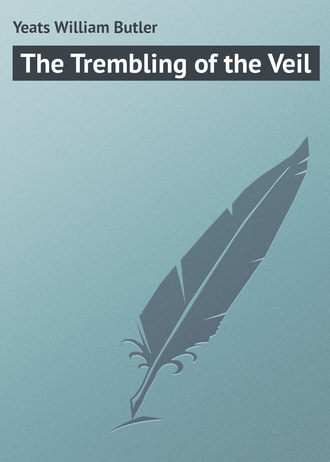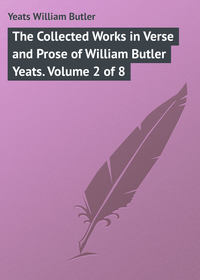
The Trembling of the Veil
Lady Gregory seeing that I was ill brought me from cottage to cottage to gather folk-belief, tales of the fairies, and the like, and wrote down herself what we had gathered, considering that this work, in which one let others talk, and walked about the fields so much, would lie, to use a country phrase, “Very light upon the mind.” She asked me to return there the next year, and for years to come I was to spend my summers at her house. When I was in good health again, I found myself indolent, partly perhaps because I was affrighted by that impossible novel, and asked her to send me to my work every day at eleven, and at some other hour to my letters, rating me with idleness if need be, and I doubt if I should have done much with my life but for her firmness and her care. After a time, though not very quickly, I recovered tolerable industry, though it has only been of late years that I have found it possible to face an hour’s verse without a preliminary struggle and much putting off.
Certain woods at Sligo, the woods above Dooney Rock and those above the waterfall at Ben Bulben, though I shall never perhaps walk there again, are so deep in my affections that I dream about them at night; and yet the woods at Coole, though they do not come into my dream are so much more knitted to my thought, that when I am dead they will have, I am persuaded, my longest visit. When we are dead, according to my belief, we live our lives backward for a certain number of years, treading the paths that we have trodden, growing young again, even childish again, till some attain an innocence that is no longer a mere accident of nature, but the human intellect’s crowning achievement. It was at Coole that the first few simple thoughts that now, grown complex, through their contact with other thoughts, explain the world, came to me from beyond my own mind. I practised meditations, and these, as I think, so affected my sleep that I began to have dreams that differed from ordinary dreams in seeming to take place amid brilliant light, and by their invariable coherence, and certain half-dreams, if I can call them so, between sleep and waking. I have noticed that such experiences come to me most often amid distraction, at some time that seems of all times the least fitting, as though it were necessary for the exterior mind to be engaged elsewhere, and it was during 1897 and 1898, when I was always just arriving from or just setting out to some political meeting, that the first dreams came. I was crossing a little stream near Inchy Wood and actually in the middle of a stride from bank to bank, when an emotion never experienced before swept down upon me. I said, “That is what the devout Christian feels, that is how he surrenders his will to the will of God.” I felt an extreme surprise for my whole imagination was preoccupied with the pagan mythology of ancient Ireland, I was marking in red ink upon a large map, every sacred mountain. The next morning I awoke near dawn, to hear a voice saying, “The love of God is infinite for every human soul because every human soul is unique, no other can satisfy the same need in God.”
Lady Gregory and I had heard many tales of changelings, grown men and women as well as children, who as the people believe are taken by the fairies, some spirit or inanimate object bewitched into their likeness remaining in their stead, and I constantly asked myself what reality there could be in these tales, often supported by so much testimony. I woke one night to find myself lying upon my back with all my limbs rigid, and to hear a ceremonial measured voice which did not seem to be mine speaking through my lips, “We make an image of him who sleeps,” it said, “and it is not him who sleeps, and we call it Emmanuel.” After many years that thought, others often found as strangely being added to it, became the thought of the Mask, which I have used in these memoirs to explain men’s characters. A few months ago at Oxford I was asking myself why it should be “An image of him who sleeps,” and took down from the shelf not knowing why I was doing so, a book which I had never read, Burkitt’s Early Eastern Christianity, and opened it at random. My eyes lit upon a passage from a Gnostic Hymn telling how a certain King’s son being exiled, slept in Egypt, a symbol of the natural state, and while he slept an Angel brought him a royal mantle; and at the bottom of the page I found a footnote saying that the word mantle did not represent the meaning properly for that which the Angel gave had the exile’s own form and likeness. I did not, however, find in the Gnostic Hymn my other thought that Egypt and that which the Mask represents are antithetical. That, I think, became clear, though I had had some premonitions when a countryman told Lady Gregory and myself that he had heard the crying of new-dropped lambs in November – Spring in the world of Fairy, being November with us.
········On the sea coast at Duras, a few miles from Coole, an old French Count, Florimond de Bastero, lived for certain months in every year. Lady Gregory and I talked over my project of an Irish Theatre looking out upon the lawn of his house, watching a large flock of ducks that was always gathered for his arrival from Paris, and that would be a very small flock, if indeed it were a flock at all, when he set out for Rome in the autumn. I told her that I had given up my project because it was impossible to get the few pounds necessary for a start in little halls, and she promised to collect or give the money necessary. That was her first great service to the Irish intellectual movement. She reminded me the other day that when she first asked me what she could do to help our movement I suggested nothing; and, certainly, no more foresaw her genius that I foresaw that of John Synge, nor had she herself foreseen it. Our theatre had been established before she wrote or had any ambition to write, and yet her little comedies have merriment and beauty, an unusual combination, and those two volumes where the Irish heroic tales are arranged and translated in an English so simple and so noble, may do more than other books to deepen Irish imagination. They contain our ancient literature, are something better than our Mabinogion, are almost our Morte D’Arthur. It is more fitting, however, that in a book of memoirs I should speak of her personal influence, and especially as no witness is likely to arise better qualified to speak. If that influence were lacking, Ireland would be greatly impoverished, so much has been planned out in the library, or among the woods at Coole; for it was there that John Shawe Taylor found the independence from class and family that made him summon the conference between landlord and tenant, that brought land purchase, and it was there that Hugh Lane formed those Irish ambitions that led to his scattering many thousands, and gathering much ingratitude; and where, but for that conversation at Florimond de Bastero’s, had been the genius of Synge?
I have written these words instead of leaving all to posterity, and though my friend’s ear seems indifferent to praise or blame, that young men to whom recent events are often more obscure than those long past, may learn what debts they owe and to what creditor.
END







